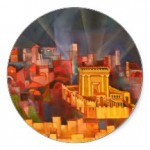Musings from Students of the Pardes Institute of Jewish Studies in Jerusalem
Posted on October 5, 2012 by Sydni Adler
 During Sukkot, we celebrate God’s hand in the successes of our past years’ produce and of all the work of our hands (Deut 16:15). Before the destruction of the Temple, Sukkot was much more of a raucous, noisy, purely joyful celebration than it is today. However, today, without the Temple and without sacrifice, what remains in our celebration is the importance of the sukkah. But I’ve been compelled to wonder, what’s so important about a sukkah? Yes, our ancestors were made to live in sukkot in the desert, but that can’t be enough. In the modern, post-Temple era, what is a sukkah?
During Sukkot, we celebrate God’s hand in the successes of our past years’ produce and of all the work of our hands (Deut 16:15). Before the destruction of the Temple, Sukkot was much more of a raucous, noisy, purely joyful celebration than it is today. However, today, without the Temple and without sacrifice, what remains in our celebration is the importance of the sukkah. But I’ve been compelled to wonder, what’s so important about a sukkah? Yes, our ancestors were made to live in sukkot in the desert, but that can’t be enough. In the modern, post-Temple era, what is a sukkah?
After looking at a few different texts integral to Sukkot, I have come to believe that each sukkah is a little piece of the Messianic Age, and even more importantly, a temporary piece of the Temple itself.
For the megillah of Sukkot, we read Ecclesiastes, where we learn that everything is futile. “That which has been, it is that which shall be; and that which has been done is that which shall be done: and there is nothing new under the sun” (Ecclesiastes 1:9). To Kohelet, human existence itself is like a sukkah, impermanent in nature. So why not, says Kohelet, enjoy what we are given? After all, we have no knowledge of what God expects from us, what God plans for us. We must make the most out of what we have, especially in a temporary structure such as a sukkah, where all people have the ability to come together in joy and leave inequalities and futile problems behind.
In addition, we read parshiyot from Exodus, Leviticus, Numbers, Deuteronomy, Kings I, Zechariah, and Ezekiel. The portions from Leviticus and Numbers focus on the celebration of appointed times for God (the chagim). However, quite out of place from its surroundings, Leviticus 23:22 introduces the concept of peyot: leaving pieces of our harvest for the poor and the stranger. Similarly, the portions from Deuteronomy intertwine mentions of Jubilee and fair treatment for those of different social classes with the celebration of chagim. Once the mention of Sukkot arises, Deuteronomy commands:
You shall observe the feast of booths seven days, after you have gathered in your corn and your wine: and you shall rejoice in your feast, you, and your son, and your daughter, and your manservant, and your maidservant, and the Levite, the stranger, and the fatherless, and the widow, that are within your gates. (Deut 16:13-14)
Without all of the sacrifices that Leviticus, Numbers, and Deuteronomy command, the fair treatment of others, especially under a sukkah, is all that remains. This fair treatment becomes sacrifice, and the sukkah becomes a place where sacrifice is acceptable.  Thus, the sukkah becomes a temporary, miniature Temple.
Thus, the sukkah becomes a temporary, miniature Temple.
The parshiyot from Exodus and Kings I further the identity of the sukkah with the Temple. In Exodus 33:12-34:26, the reading that occurs during the Shabbat of Chol HaMoed, Moses encounters God’s presence directly (Ex 33:12) and receives the final version of the Ten Commandments. In the readings from Kings I, King Solomon takes the Ark of the Covenant, which contains nothing but those Ten Commandments to the Temple (1 Kings 8:9). Thus, the Temple is completed, and the priests feel the same Presence of God that Moses felt earlier: “And it came to pass, when the priests were come out of the holy place, that the cloud filled the house of HaShem, so that the priest could not stand to minister because of the cloud: for the glory of HaShem had filled the house of HaShem” (1 Kings 8:10-11). As we read about God’s presence in the construction of the Temple, we are reminded of our personal ability, and furthermore, our duty to take steps towards bringing that Temple back. Rather than feeling inhibited by Kohelet’s claim that we have no knowledge of God’s will, we should feel encouraged by Kohelet’s claim that we should enjoy what God has given us. By enjoying our wealth, and that of our neighbors’ from their diverse backgrounds, within the shelter of the sukkah, we create a miniature Temple, a place for sacrifice, worship, and perhaps most importantly, joy in a faith-driven love for God.
Finally, we arrive at the morally challenging readings of Zechariah and Ezekiel. The readings from Exodus and Kings 1 detail the past, the readings from Leviticus, Numbers, and Deuteronomy detail the present, and the readings from Zechariah and Ezekiel detail the future. All can be combined to form a future vision of Jerusalem, the Temple, and the Messianic Age. The readings from Zechariah and Ezekiel detail a Messianic Age in which all other nations worship God or else. Zechariah writes about Sukkot:
And it shall come to pass, that every one that is left of all the nations who came aginst Jerusalem shall go up from year to year to worship the King, the Lord of hosts, and to keep the feast of booths. And whoever does not come up of all the families of the earth to Jerusalem to worship the King, the Lord of hosts, upon them shall be no rain. (Zech 14:16-17)
Must intolerance of other views, then, become part of the sukkat shlomecha that we hear of in “Hashkiveinu”? Must such a view of the Messianic Age become part of God’s sukkah shelter as prescribed in Psalm 27, which we have been reading every day since the beginning of Elul? Perhaps, rather than performing violence on our neighbors, as proposed in Zechariah and Ezekiel, can we achieve the glorious Messianic Age through the civil commandments proposed in Leviticus and Deuteronomy, through the pure love of life proposed in Kohelet. All else is futile, but what if we make our sukkot into havens for peace? Lets make our sukkot into sukkot shlomechot, through which we can gently show our neighbors, even the strangers in our midst, the glory of basking in the midst of God’s Presence, whether or not they call God’s Presence the same name that we do.
For the past few weeks, we have been repeating:
HaShem, HaShem, a God compassionate and gracious, slow to anger, abounding in kindness and faithfulness, extending kindness to the thousandth generation, forgiving iniquity, transgression, and sin… (Ex 34:6-7).
This statement does not disappear on Sukkot but is present in the Torah reading on Shabbat of Chol HaMoed. We spent all of Elul, Rosh Hashanah, and Yom Kippur focusing on teshuva, focusing on joy, repentence, the glory of God’s kingship, and most importantly, on returning.  Every year, we hope to return to somewhere beyond where we returned last year, bolstered by our love for God’s attributes and determined to make the most of God’s compassion and fair judgment. Each year, after clearing our souls and preparing them as much as we can, we return to Sukkot.
Every year, we hope to return to somewhere beyond where we returned last year, bolstered by our love for God’s attributes and determined to make the most of God’s compassion and fair judgment. Each year, after clearing our souls and preparing them as much as we can, we return to Sukkot.
Perhaps in this year and the following, we can work to make our sukkah a more welcoming, celebratory place each Sukkot. Perhaps, we can work to make our Sukkot little remnants of the Temple, of our ideal Messianic Age. With Sukkot, we can work towards our own, individual, creative notions of Olam HaBa, and we can share those notions with others. Little by little, we can build towards some Sukkot in the future, in which we all create sukkot bursting with so much joy that we’ll overflow our sukkot and contribute to a permanent Temple, a permanent Messianic Age, in which every individual and every nation will be able to worship the God that speaks to them.